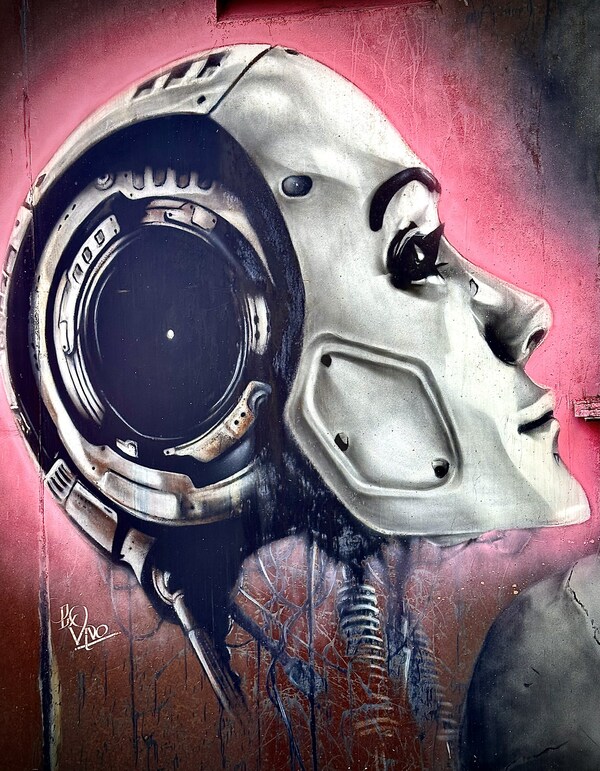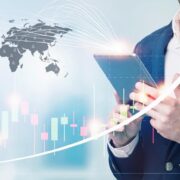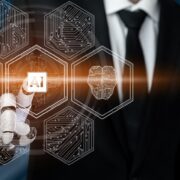Artprice by Artmarket’s deployment of algorithmic AI via its proprietary Intuitive Artmarket is a tool that can generate highly relevant and personalized recommendations, allowing users to go infinitely further in their discovery of art and the art market.
Serveur Group, the founding shareholder of Artprice by Artmarket, is still by far the largest stakeholder with 45.78% of the voting rights (Ehrmann family not included). Serveur Group is one of Europe’s leading pioneers of the Internet, computer graphics, pattern recognition, and professional databases since 1987 (see TIME Magazine 2001) and therefore has a deep-rooted and highly-advanced digital and scientific culture.
Over the past few decades, Artprice by Artmarket.com and Serveur Group have developed thousands of increasingly powerful and relevant proprietary algorithms that allow the implementation of their own AI, in strict compliance with existing regulations, notably those relative to personal data and intellectual property.
This evolution was made possible by Serveur Group’s and then Artprice’s subsequent acquisition of innovative companies Like Xylogic, a Swiss company made up exclusively of prestigious scientists (from CERN, WHO, etc.) since 1999. In retrospect, this move (and others) was considerably ahead of its time, and it laid the foundations for our move toward the use of Artificial Intelligence to enhance the transparency and dynamism of the art market.
It is important to remember that Artprice by Artmarket has twice consecutively (a rare occurrence for companies listed on a regulated market) been awarded France’s state-backed “Innovative Company” label which is subject to strict eligibility and is awarded by the Banque Publique d’Investissement (bpifrance).
As regards the current legislative context, we note that quite apart from the battery of legislation regarding General Data Protection Regulation (GDPR), the proposed European law on artificial intelligence (EU AI Act) and all existing intellectual property laws mean that the use of artificial intelligence in Europe (and probably the rest of the world shortly thereafter) will be subject to a great many constraints.
The principle problem may be expressed as follows: how to deliver a relevant AI result to users without walking all over intellectual property rights? Remember that the outcome of any search using Artificial Intelligence is only, in fine, a result contrived by the algorithmic processing of billions of already existing data.
Then there is the problem of ascertaining who owns the data in order to pay any copyright and related rights to be able to use it legally for commercial purposes… configuring a paid service that respects the intellectual property laws of each country… that is the challenge (no less!).
According to thierry Ehrmann, founder of Artprice and CEO of Artmarket.com, Artprice by Artmarket will be able, through its own AI Intuitive Artmarket®, to take each of its 7.2 million customers and members “from discovery to revelation…”.
“…Our algorithms can parse billions of proprietary logs, texts, and hundreds of millions of artworks from Artprice’s databases. They can identify semantics that qualify an artist’s primary artistic ambitions, his/her universe, inspirations, mediums used, major themes developed, shapes and volumes worked, etc… and then search for corresponding syntonies in our logs of 810,000 artists with their biographies and certified data. In other words, instead of relying on academic visual criteria, the system will make connections based on the neural networks of our artificial intelligence, Intuitive Artmarket®.”
Neural networks, also called ‘artificial neural networks’ (ANNs) or just ‘neural nets’ are a subset of machine learning and are at the heart of deep-learning algorithms. Their name and structure are inspired by the human brain, mimicking the way biological neurons and their synapses send signals to each other along the axons.
Artprice by Artmarket.com’s spiking neural networks rely on initial data training that teaches them to learn and improve their accuracy over time. Once these learning algorithms are tuned with high precision, they represent powerful tools in the fields of computer science and artificial intelligence, and it is these AI algorithms that will allow Intuitive Artmarket® to classify and collate multimedia data at a very high speed.
For example, high-definition images or even old fine art engravings can be recognized in seconds rather than tens of minutes in a manual identification process conducted by well-known fine art experts.
If we look a the bigger picture, it has been very interesting to observe the trials and tribulations of one of the best-known neural networks on the planet, Google’s search algorithm (which Artprice has been studying and analyzing daily since 1999). Since the beginning of 2023, Artprice Inc., Artmarket’s American subsidiary, has been closely watching the development of Bard, Google’s prototype chatbot based on its LaMDA language model. Google CEO Sundar Pichai is acutely aware of the opportunities and risks in this project and is reported to have issued a company-wide “code red” for its development. Whether or not this is true, Google, with a global market share of 93%, is the best laboratory for studying AI because it has a colossal existing economic dimension, unlike other AIs, where the risks (and economic profits) are still ‘potential’.
Artprice by Artmarket’s R&D department is creating spiking neural networks (SNNs) which ‘cogitate’ differently from human beings, without biases from emotions or ‘disorders’. Our ambition is of course to put artificial intelligence at the service of art and art market professionals, institutions, collectors, and enthusiasts.
So, quite apart from its technical and scientific competence, Artprice by Artmarket’s overwhelming strength is its capacity to use its own high-value-added data, produced and delivered for 25 years now as World Leader in Art Market Information. Not only does our position guarantee an unmatched level of consistency and relevance with respect to the responses it gives to searches, but it also overrides many of the aforementioned copyright issues, since our data is… our data.
Artprice by Artmarket.com is the most important market-info player in the global art market. Its Artprice department has the most comprehensive databases on art prices and art market indices, with more than 30 million indices and sales results concerning works by more than 810,000 artists.
Artprice Images® provides unlimited access to the largest art market archive in the world, with its documentary collection of manuscripts and auction catalogs, forming a physical and digital library made up of 180 million images (or engravings) of artworks from 1700 to the present day, all checked and commented by art historians. In this very specific economic sector, no company in the world has such a high volume of ultra-qualified and proprietary data, with the original documentation being a very important asset and representing an almost impregnable barrier to entry.
In addition, Artmarket, with its Artprice department, constantly enriches its databases with data from 6,500 auction houses and it continuously publishes art market trends for the world’s main press agencies and 7,200 press titles around the world. This inexhaustible source of continually up to date data will ensure that Intuitive Artmarket® will be way ahead of its competitors.
Very few companies in the world can claim to use AI on a proprietary terrain. And yet it is the only way of complying with the various intellectual property laws around the world, which are increasingly vast and complex, with grueling legal procedures taking over several years.
Artprice by Artmarket has registered as a professional beta-tester with Microsoft® and its Bing® search engine linked to GPT-4. Bing’s AI can search on the Internet, whereas ChatGPT (excluding plugins) is currently limited to a database that stops in the year 2021.
The possibilities offered by the tool are therefore immense, hence its popularity: Microsoft® Bing Chat now attracts more than 100 million active daily users and comes with a commitment to “responsible AI” that respects copyrights and other related rights.
The fact that Microsoft has just launched a paid subscription of $240/year to use its AI tool confirms the viability of this economic model for Artprice and its own AI, Intuitive Artmarket®.
In thousands of beta-test searches with terms related to artists and the art market, Artprice by Artmarket has observed that the responses provided by Bing AI GPT-4 regularly quoted Artprice.com and Artmarket.com URLs as references for their sources. Microsoft’s Bing works in partnership with OpenAI to provide an experience that encourages responsible use.
As we have seen, the development and implementation of ‘responsible AI’ is currently one of the major concerns of the G7 nations (announcement of April 30, 2023), as is the adoption of ‘global regulations’ on AI in the shortest possible timeframe.
Regarding copyright legislation in the context of artificial intelligence, the EU’s Competition Commissioner Margrethe Vestager said the bloc “should find a political agreement as early as this year” (Reuters News: April 30, 2023), which is very positive for Artmarket.com.
We have also seen the Italian government’s reaction to ChatGPT: it is strictly prohibited in Italy. This illustrates the kind of obstacle that AI developers face, regardless of their financial power and their lobbying capacity.
The truth is, in the AI domain, the potential for IP conflict is exponential. Take for example Stability AI, the creator of an AI generating synthetic photos, currently being accused of having extracted millions of images from the databases of Getty Images.
Artmarket’s AI (Intuitive Artmarket ®) works exclusively within a perimeter of proprietary content and is therefore protected under intellectual property legislation. This proprietary content is an almost infinite data mine built over three decades and covering more than four centuries of art market activity. The net result is that the aforementioned obstacles and potential prohibitions do not concern us because we do not need to look elsewhere for data or answers to very specific searches by people working on or interested in art and/or the art market.
This fact is, therefore, a guarantee not just of the sustainability of Artprice by Artmarket’s economic model, but also of our shareholders’ peace of mind and of considerable growth in the future of Artprice by Artmarket.com’s business, with a constant increase in turnover.
The use of artificial intelligence will increase Artmarket.com’s revenue, while ultimately reducing its operating costs. Our Intuitive Artmarket® will provide our art market clients and participants with very relevant and truly personalized recommendations, allowing them to deepen their own knowledge of the art market, and de facto, will generate more sophisticated subscriptions and therefore a greater volume of annual recurring revenue (ARR).
Intuitive Artmarket® will provide precise answers to users’ searches quickly and the time saved will reduce energy consumption, which is fully in line with Artmarket’s eco-responsible philosophy. As a result of the reliable, scientific, and sustainable avant-garde energy solutions implemented by Artprice by Artmarket, our CSR report testifies to an extremely positive ecological impact.
At the forefront of digital regulations, Europe is currently drafting laws on AI with its “Artificial Intelligence Act” and Artprice by Artmarket is contributing to this process with its lawyers and advisers. The Act aims to establish a number of specific constraints taking into account personal data protection as well as copyright and exhaustive source citation.
According to the best Anglo-Saxon financial analysts – who are one step ahead of Europe in this area – the only economically viable model that does not expose the economic entity (however big or small) to incessant legal proceedings is an AI-based on an extremely well-defined economic segment where information plays a key role, and where the entity in question has full intellectual property of all the Big Data (including Data mining), and confirmed ownership of the copyrights and associated rights to that data on all its algorithms, databases, machine learning, and neural networks.
In short, the AIs that will triumph with a very substantial economic gain, without major industrial or legal risk, are the economic entities that own the full intellectual property rights to all of the different stages of a proprietary AI in a defined market segment where high value-added information, at a high cost, is vital. This is precisely the case with our AI project Intuitive Artmarket® developed by Artprice by Artmarket.com
Many researchers are trying to establish the genesis of AI.
Of the myriad of possible answers to this question, Artprice was intrigued by an article that appeared on the website “The Conversation” (Academic rigor, journalistic flair). Entitled “Blaise Pascal and the beginnings of artificial intelligence”, the article offers a judicious answer: Blaise Pascal (1623-1662) can be credited with two essential innovations that make it possible to envisage artificial intelligence today: he developed the first mechanical calculator in history and he developed the first rudiments of the calculation of probabilities.
According to thierry Ehrmann, Founder of Artprice and CEO of Artmarket, the Group’s guideline for its AI is very simple: “There can be no artificial intelligence without human intelligence”.








